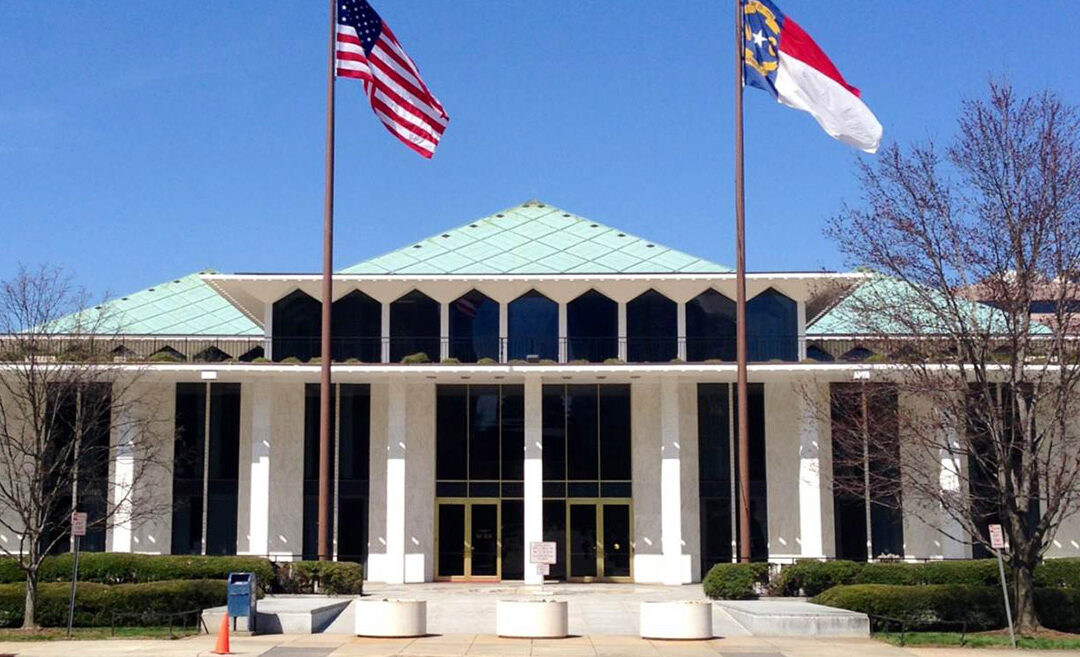


Take Action: Tell Congress to Protect Public Land Roadless Areas, Pass RACA
Take Action: Tell Congress to Protect Public Land Roadless Areas, Pass RACA
Tell Congress: Pass the Roadless Area Conservation Act Making Protection Permanent
On June 23rd, Agriculture Secretary Rollins announced that the Trump Administration will end the Roadless Rule, which has protected 58.5 million acres of roadless Forest Service land for 25 years. The Roadless Rule was finalized in 2001 after years of planning and public consultation. Over 600 public meetings were held and 1.6 million public comments were received on the rule, with 97% in favor of protecting the last wild areas in America from roadbuilding and commercial logging.
While most Roadless Areas are in the western US and Alaska, North Carolina is blessed with more public land and wild country than most eastern states. About 15%, or 152,000 acres, of Nantahala and Pisgah National Forests are protected by the Roadless Rule. These areas include well-known and beloved places like Cheoah Bald, South Mills River, Laurel Mountain, the Black Mountains, Tusquitee Bald, and Upper Wilson Creek. Roadless areas provide the best remaining fish and wildlife habitat in the nation, and unique recreational opportunities. Ending the roadless rule is nothing more than a handout to a small group of people that would benefit from logging and mining them.
But what about wildfire risk, some will ask? The truth of the matter is that fire is a crucial part of forest health, and roads bring both more arson fires and more fire suppression. The natural fires that burn in roadless areas maintain and renew the forest and don’t harm communities, which are by definition far from roadless areas. Plus, the Roadless Rule already contains the flexibility to cut trees to reduce wildfire risk and insect outbreaks. The Roadless Rule is working – don’t let oligarchs and bureaucrats take it away!
Fight for Roadless Areas!
Fortunately, The Roadless Area Conservation Act (RACA) has been introduced in the Senate with many co-sponsors. RACA would make the Roadless Rule more durable and end the ability of bureaucrats to remove it with a simple rulemaking process. Contact your Senators and Congressional Representatives today, and ask them to support the Roadless Area Conservation Act and oppose Secretary Rollins’ attempt to end the rule.

MT Raleigh Report: NC General Assembly Wraps Up for Summer – With Key Wins for WNC Disaster Recovery
MT Raleigh Report: NC General Assembly Wraps Up for Summer – With Key Wins for WNC Disaster Recovery
June 30, 2025
Last week, the North Carolina General Assembly wrapped up what is expected to be the bulk of its work for the 2025 legislative session — with one major exception. Here’s a look at what lawmakers accomplished, what remains unresolved, and how MountainTrue’s advocacy made a difference for Western North Carolina and the ongoing recovery from Hurricane Helene.
Progress on Disaster Recovery for WNC
Despite failing to pass a full state budget (more on that below), House and Senate leaders came together at the last minute to approve nearly $500 million in disaster relief funding — including several items MountainTrue directly advocated for and supported:
- $10 million to repair, modify, or remove dams damaged by Hurricane Helene
- $3 million for landslide hazard mapping in Western North Carolina
- $15 million for the NC Forest Service to strengthen wildfire preparedness, including equipment and contract services
- $16 million for the Town of Canton, including:
- $2 million in emergency operating support to maintain wastewater treatment services
- $14 million for acquisition and development of a new regional wastewater treatment facility outside the floodplain — a major step forward for long-term resilience and environmental protection
These critical investments represent real progress for our region and reflect the strength of your support and our collective advocacy efforts.
Budget Impasse Continues
Unfortunately, the General Assembly adjourned without approving a new state budget. At the heart of the deadlock: a bitter standoff between House and Senate Republicans over tax policy.
- House Republicans want to freeze previously approved tax cuts that are just now taking effect, citing warnings from nonpartisan economists about future budget shortfalls.
- Senate Republicans dismiss those concerns and are pushing to accelerate the cuts.
Until this impasse is resolved, negotiations over the rest of the $32 billion state budget — including funding for schools, healthcare, infrastructure, and environmental protection — remain on hold.
What’s Next
The legislature is expected to take most of the summer off, returning sporadically until one side gives ground. In the meantime, MountainTrue’s advocacy team will be ready, continuing to push for smart investments and policies that protect our rivers, forests, and mountain communities.
We couldn’t do this work without you — thank you for standing with us.

Resilient Forests Organizer
Position Summary
MountainTrue is seeking a Resilient Forests Organizer. This is a full-time position (40hrs/week) based in western North Carolina that reports to the Organizing Manager. They are tasked with:
60% – Organizing, advocacy, and outreach to engage the public to address threats and seek opportunities to protect, invest in, and better steward local, state, and federal public lands in the region.
40% – Manage volunteers to steward public lands and build a sense of ownership and appreciation for our public lands through activities such as non-native species control, ecological restoration, and monitoring and maintenance of trail and road infrastructure on public lands.
Key Responsibilities
- Work with the Resilient Forests Program Director, Organizing Manager, Deputy Directors, Regional Directors, and partner organizations to organize the public around campaigns to protect public lands from exploitation.
- Support the Resilient Forests Program Director, the Organizing Manager, and Regional Directors to organize MountainTrue members and the general public to steward public lands by controlling invasive species, maintaining trails, monitoring road conditions, and helping to accomplish ecological restoration projects.
- Educate the public about their rights and responsibilities through curricula, blog posts, social media, letters to the editor, and opinion pieces related to public lands.
Qualifications
Organizing Experience: Proven experience working with communities on issue campaigns through on-the-ground grassroots organizing and online mobilization.
Project Leadership: Experience in planning, leading, and managing projects, including coordinating with peers to achieve desired outcomes, and tracking and reporting on progress to senior managers.
Communications: Skilled in creating powerful, compelling written and oral communications. Ability to convey complex ideas through brief, simple materials. Experience and credibility when presenting materials to external audiences.
Collaboration: Effective at working with others to reach common goals and objectives.
Relationship Building: Skilled at establishing and cultivating strong relationships with peers, across different levels of the organization and externally. Proven ability to establish strong relationships with community members.
Additional Qualifications: Required
- Familiarity with Western North Carolina and the Southern Blue Ridge Mountains.
- Demonstrated excellence in organizational, interpersonal, and communication skills.
- Proficiency and comfort with public speaking.
- Experience and ability to work outdoors, including in steep terrain and inclement weather.
- Willingness to learn new skills and grow.
Additional Preferred Experience
- Experience with online advocacy tools or CRMs such as EveryAction, Bonterra, Action Network, Salsa Labs, Blue State Digital, or Nationbuilder
- Proficiency in basic computer applications and software
- Fundraising experience
- Project management tools such as Asana, Monday, or Zoho
- Leading groups in outdoor settings
- Knowledge of public lands and local conservation issues
- Knowledge of local flora, fauna, and ecology
- Experience with wilderness first aid
Location & Travel
This position is based in Western North Carolina. This position utilizes frequent virtual meetings and phone calls. Travel costs are covered by the organization.
Compensation
$50,000 annual salary. The benefits package includes 20 vacation days per year, 12 holidays, sick leave, a sabbatical after five years, health insurance, and a simple IRA with an employer contribution of up to 3%. MountainTrue provides continuing education and professional development support.
How to apply
Email resume, cover letter, and three references to Organizing Manager Linda Tatsapaugh at linda@mountaintrue.org.
In your cover letter, describe your role in a past grassroots campaign and what you learned from the experience. Also, name your favorite protected species (flora or fauna) and why.
Application deadline: Friday, July 25, 2025
MountainTrue values and respects all types of diversity and strongly encourages applicants from traditionally marginalized groups to apply. We prohibit discrimination and harassment and provide equal employment opportunity without regard to, and not limited to, ethnicity, religion, race, national origin, abilities, gender identity, age or genetic information. We are committed to recruiting, hiring, and promoting those from minority and disadvantaged groups.

Take Action: Protect Lake Chatuge Shoreline Wetlands
Take Action: Protect Lake Chatuge Shoreline Wetlands
Photo: Wetlands around the shore of Lake Chatuge would be permanently impacted by a proposed new development.
One of our Swim Guide volunteers was wearing a t-shirt yesterday that said “Lake Chatuge is my happy place.” I’m sure many of you share that sentiment, especially given the number of comments submitted recently on the spillway repair project.
We need your help today to protect Lake Chatuge in a different way. A new residential development is being proposed off of Elf School Road in Clay County, NC. If it gets permitted as planned, the project will permanently alter the way water flows and is filtered before entering Lake Chatuge and wipe out more than 60% of the existing wetlands. Agencies are requesting public comments on this project by Friday, June 27.
Will you take action now to protect Lake Chatuge’s water quality & wildlife habitat?
There are two parcels involved in the development on either side of the road, one of which is upland that is currently forested with moderately steep slopes; the other is lowland on the Lake Chatuge shoreline. At the heart of the lowlands is approximately 0.36 acres of stream and 0.26 acres of wetlands. Developers propose to build a dam below the uppermost part of the wetlands to create a water feature and permanently destroy 0.16 acres — 61.5% of the total amount of wetlands on the parcel. Construction of 39 housing units in the small watershed of the intermittent stream would likely significantly degrade the remaining wetlands as well.
Wetlands sustain a large number of plant and animal species, some of which are only found there. They can improve water quality; reduce erosion and flooding; and moderate the effects of warming water temperatures. They can also be beautiful places for people to enjoy the outdoors. Hundreds of acres of wetlands have been lost to development projects just like this one over the years. While MountainTrue is generally not opposed to development and we recognize the critical need for more homes in Clay County, we want to conserve the remaining wetlands we have, especially along lake shorelines where they help to improve water quality.
Please ask the U.S. Army Corps of Engineers and NC Division of Water Resources to protect the existing wetlands and water quality in Lake Chatuge during this permitting process. We can’t afford to lose any more! Be sure to submit your comments before Friday, June 27.
Thank you for helping protect Lake Chatuge and the streams and wetlands around it.

Take Action: Tell NC Senate to Keep Funding for Dam Removal in HB1012 – Disaster Recovery Part II
Take Action: Tell NC Senate to Keep Funding for Dam Removal in HB1012 – Disaster Recovery Part II
Photo: American Rivers, Conservation Trust for North Carolina, MountainTrue, Friends of the Mountains-to-Sea Trail, the NC Wildlife Resources Commission, and the National Park Service (NPS) came together to remove an earthen dam from Cranberry Creek Preserve in the New River watershed this May.
Tell NC Senate: Let’s Keep the Momentum for Dam Removal
We’re grateful to members of the North Carolina House for including funding for dam removal in HB1012. Now it’s up to the Senate to support this investment to help keep our communities safer, restore rivers, and support local jobs and economies.
When Hurricane Helene struck, 41 dams failed or were severely damaged, putting homes, roads, and lives at risk. Hundreds more outdated, unmaintained dams remain across the state—each one a potential hazard.
We’ve already seen the power of dam removal in action. The Shulls Mill Dam, removed in 2024 with state support, helped prevent infrastructure damage during Helene flooding on the Watauga River. Just downstream, the Wards Mill Dam removal protected neighbors and opened up miles of habitat for native species.
Let’s build on that success.
Take a moment to tell Senators to prioritize dam removal funding to continue supporting this life-saving, river-restoring work.
